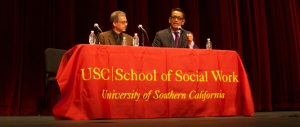Social Work Tackles Immigration and Social Justice
February 21, 2012 / by Maya MeinertChants of “justice” and “freedom” rang out in front of Bovard Auditorium the morning of Feb. 16 as some USC School of Social Work students, failing to provide two forms of identification after being randomly asked to do so, were put into a special holding area.
As other students, and even staff and faculty, looked on in confusion, they wondered, would they be able to participate in All School Day? Shouldn’t they be able to?
The guerilla theater performance demonstrating racial profiling was a fitting introduction to this year’s “Do I Look Illegal?” All School Day, which celebrated diversity while confronting the realities of social policies that have affected many of the clients social workers serve.
The current political context of immigration makes the job of social workers much harder. In light of several states’ local immigration reforms aimed at identifying, prosecuting and deporting illegal immigrants, the National Association of Social Workers, which offers guidance in the profession, strongly opposes laws that criminalize immigrants, endanger human rights and threaten civil liberties. The laws make the failure to carry immigration documents a crime and give police broad power to detain anyone suspected of being in the country illegally simply based on appearance.
“We’re here to recommit us as one body to social justice,” Dean Marilyn Flynn said of All School Day, which began in 1992 after racial tensions sparked the Los Angeles riots. Each year since, the school has brought people together to raise awareness about diversity and matters of human conflict.
The topic of social justice in immigration hit home for many. In discussing civil and human rights issues, many students and the day’s guest experts, including keynote speakers California state Assemblyman Gilbert Cedillo and Manuel Pastor, professor of American studies and ethnicity from the USC Dana and David Dornsife College of Letters, Arts and Sciences, related personal stories about their immigrant families.
“The great thing about our nation is that one education can transform the life of you, your family and your community,” said Cedillo, who described how attending a university changed the narrative of his family’s history. “The whole point of a democracy is to get away from the monarchies and caste systems that say where you’re born is where you stay. You can be a participant in this society.”
Cedillo is the author of the California DREAM Act, a package of state laws that allows children who were brought into the United States under the age of 16 without proper visas or immigration documentation and who have attended school on a regular basis and meet in-state tuition and GPA requirements to be eligible for student financial aid.
“The American story is social policies that make it possible for people to achieve their dreams, and the social movements – the labor, civil and veterans movements – that made all those policies possible,” said Pastor, whose father was an immigrant.
Pastor, who directs the USC Center for the Study of Immigration Integration, also offered advice on how to change the conversation on immigration issues as social workers.
“Talk to someone who doesn’t agree with you. Talking in an echo chamber doesn’t help,” he said. “Develop one-on-one relationships. The conversation needs to move to the middle [politically] to be effective.”
The event’s panelists, which included Niels Frenzen of the USC Gould School of Law, Ange-Marie Hancock of USC Dornsife and Angelica Salas, executive director of the Coalition for Humane Immigrant Rights of Los Angeles, provided legal, experiential and practical examples of how to approach the often contentious issues surrounding immigration and immigrants.
Frenzen, who serves as director of the USC Law Immigration Clinic, gave historical, political and legal context to the immigration debate.
“One of the unintended consequences of increased border enforcement and militarization of the U.S.-Mexican border has been, when people get here they stay here, because it’s more dangerous and expensive [to leave],” Frenzen said.
Hancock, who works with Pastor as associate director of the Center for the Study of Immigration Integration, talked about her experience with creating welcoming communities out of those that receive a large number of immigrants.
“How do we prepare the hearts and minds of people to deal with their communities changing?” Hancock said. “We need to work on the interdependence among the younger generations. Older folks need to understand that investments in children now [in public K-12 education] will impact the greater society later; they’ll be the ones who will help take care of them in their old age.”
Salas spoke about advocating “not for, but with, immigrants because no one can tell elected officials what immigrants go through like the immigrants themselves.”
To reference the work of our faculty online, we ask that you directly quote their work where possible and attribute it to "FACULTY NAME, a professor in the USC Suzanne Dworak-Peck School of Social Work” (LINK: https://dworakpeck.usc.edu)
